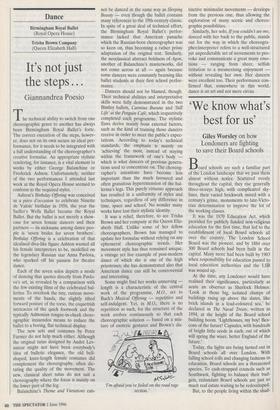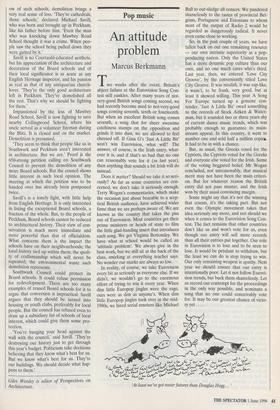'We know what's best for us'
Giles Worsley on how Londoners are fighting to save their Board schools Board schools are such a familiar part of the London landscape that we pass them almost without notice. Scattered evenly throughout the capital, they rise generally three-storeys high, with complicated sky- lines, their varied brickwork mired with a century's grime, monuments to late-Victo- rian determination to improve the lot of the working classes.
It was the 1870 Education Act, which provided for publicly funded non-religious education for the first time, that led to the establishment of local Board schools all over the country. The London School Board was the pioneer, and by 1884 over 300 Board schools had been built in the capital. Many more had been built by 1903 when responsibility for education passed to local education authorities and the LSB was wound up.
At the time, any Londoner would have realised their significance, particularly as acute an observer as Sherlock Holmes: 'Look at those big, isolated clumps of buildings rising up above the slates, like brick islands in a lead-coloured sea,' he declared in The Naval Treaty, written in 1894, at the height of the Board school building boom. 'Lighthouses, my boy! Bea- cons of the future! Capsules, with hundreds of bright little seeds in each, out of which will spring the wiser, better England of the future.'
Today, the lights are being turned out in Board schools - all over London. With falling school rolls and changing fashions in education, Board schools are a threatened species. To cash-strapped councils such as Southwark, fighting to balance their bud- gets, redundant Board schools are just so much real estate waiting to be redeveloped. But, to the people living within the shad- ow of such schools, demolition brings a very real sense of loss. 'They're cathedrals, those schools,' declared Michael Savill, who was born and brought up in Peckham, like his father before him. 'Even the man who was knocking down Mawbey Road School thought it was a crime. When peo- ple saw the school being pulled down they were gutted by it.'
Savill is no Courtauld-educated aesthete, but his appreciation of the architecture and decoration of the Board schools and of their local significance is as acute as any English Heritage inspector, and his passion as real as that of any antiquarian church- lover. 'They're the only good architecture left in Peckham. They've demolished all the rest. That's why we should be fighting for them.'
Impassioned by the loss of Mawbey Road School, Savill is now fighting to save nearby Collingwood School, where his uncle served as a volunteer fireman during the Blitz. It is closed and on the market. Demolition is presumed.
'They seem to think that people like us in Southwark and Peckham aren't interested in architecture. But we are.' Proof is the 650-strong petition calling on Southwark Council to prevent the demolition of any more Board schools. But the council shows little interest in such local opinion. The meeting at which the petition was to be handed over has already been postponed twice.
Savill's is a lonely fight, with little help from English Heritage. It is only interested in listing the exceptional Board schools, a fraction of the whole. But, to the people of Peckham, Board schools cannot be reduced to architectural history. Their view of con- servation is much more immediate and more powerful than that of officialdom. What concerns them is the impact the schools have on their neighbourhoods; the local history tied up within them; the quali- ty of craftsmanship which will never be repeated; the environmental waste such demolition represents.
Southwark Council could protect its Board schools. It could refuse permission for redevelopment. There are too many examples of reused Board schools for it to argue that conversion is impractical. Savill argues that they should be turned into housing or youth clubs, preferably for local people. But the council has refused even to draw up a subsidiary list of schools of local interest, which could give them some pro- tection.
'You're banging your head against the wall with the council,' said Savill. 'They're destroying our history just to get through this year's budget. Politicians take decisions believing that they know what's best for us. But we know what's best for us. They're our buildings. We should decide what hap- pens to them.'
Giles Worsley is editor of Perspectives on Architecture.



























































 Previous page
Previous page